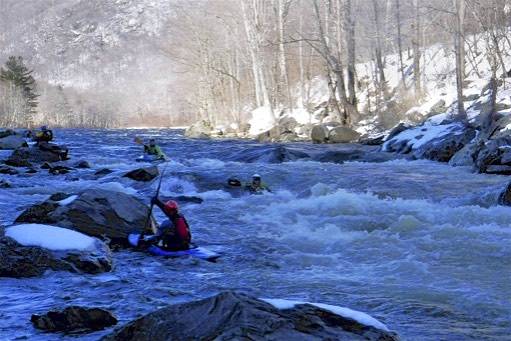Last weekend, I was sitting on the rocks in the middle of Zoar Gap on the Deerfield River taking pictures. The rest of the group had just paddled through, and now it was my turn. I could have easily slipped my boat back into the water, pealed out into the current, and attempted to hug the right line through the Gap as I have with mixed success so many times before. Instead, I decided to walk my boat, and I’ve felt guilty about it ever since.
I know that my guilt is entirely self-imposed - no one in the group said a word, or even seemed to care. Still, it brings up a question that I struggle with on occasion – does walking a rapid make you less of a paddler? This probably isn’t a question that just whitewater paddlers wrestle with.
So how far should we push ourselves, and when is it OK to step back? I think there’s a lot of truth to the old adage “if you aren’t swimming, you aren’t trying hard enough”. To become a better paddler you definitely need to take risks, and if walking becomes a crutch, then that’s a problem. Based on the number of swims that I have taken over the past few years, I’m not worried about that yet.
But does that mean that you need to run every rapid, or take every risk? Stretching your abilities is one thing, but I also try to temper that with the desire to be self-sufficient. It’s good to know that the group is there to support me, but it’s even better if they don’t have to.
So personally, I have come to the conclusion that occasionally it is OK not to run a rapid. Paddling is not about a single event. It’s about running the river, and getting home that night to run another river another day. It’s about pushing your abilities, but not putting yourself or others at unreasonable risk. It’s about enjoying a day on the water with a great group of people. So if my ego gets bruised occasionally, either by swimming or by walking, I’m OK with that.
So to all my paddling friends, here’s the deal - if I’m tired, if I’m cold, if my gut is telling me that today is not the day to run that rapid, I might walk. But if I don’t, thanks in advance for fishing me out when I swim. I’ll try to do the same for you.

That’s me on the rock to the left getting ready not to run Zoar Gap
